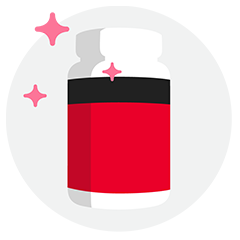The relationship between aging and heart health

If you’re young and healthy, you may not have heart disease on your mind. Although heart disease is most prevalent in individuals who are 60 years of age or older, it can begin to develop in earlier stages of your life as well.
Heart disease is the second leading cause of death in Canada, after cancer. But, looking after your heart from a young age can give you the upper hand in tackling heart disease or even preventing it altogether.
Let’s start by discussing how the heart changes while we age.
What does an aging heart look like?
As we age, our appearance is not the only thing that can change. We experience many internal changes as well, from our bones shrinking and muscle mass decreasing to changes in our heart and blood vessels. Knowing how our heart changes as we get older can help us understand what our bodies need to keep our hearts strong and healthy.
In your 20s and 30s
Early adulthood is filled with new experiences, from potentially being away from home for the first time and experiencing life with no curfew, to learning to navigate the world as an adult. This may mean a lot of late nights, increased stress, and maybe even indulging in more takeout and fast food.
All these factors have an impact on your heart. According to John Hopkins Medicine, plaque deposits can start to form in your arteries as early as your teenage years but take decades to cause heart disease. So, adopting a healthy lifestyle from the get-go significantly improves your chances of a healthy heart in the future. Try to balance indulgences with responsible choices. This way, you’re watching out for your health and having fun at the same time!
Smoking
When it comes to making responsible choices, avoiding smoking or quitting it altogether if you’re already a smoker is a good place to start. Smoking increases your risk of heart disease because it can cause your blood pressure levels to rise, which is one major risk factor for cardiovascular disease.
Managing stress
Cooling down and reducing your anger during this age is also essential for a healthy heart. Studies on young men show that individuals who experience frequent outbursts of anger are three times more likely to have premature heart disease. They are also five times more likely to have a heart attack.
To manage your anger and stress levels, try a yoga or mediation class, practice journaling, use deep breathing techniques and spend more time outdoors. Following a regular exercise routine can also help with this.
In your 40s

Your 40s may be a time when you’re busier, such as managing your career or balancing family life. Or maybe even both. This might mean that you don’t have as much time to focus on your health. But your heart health is still important.
In order to maintain a healthy heart, keeping an eye on concerns such as belly fat and weight gain, diabetes, blood pressure, and cholesterol is key during midlife. To combat these, you need to keep moving! Whether it’s taking a daily walk or spending time with your kids, daily physical activity is crucial for maintaining heart health.
That’s because a lack of physical activity increases your cholesterol and blood pressure levels. A sedentary lifestyle increases your heart rate, which makes it harder for your heart to pump blood throughout the body and elevates the force on your arteries as well. Eventually, this results in high blood pressure and increases your chances of being overweight. And obesity can cause high triglyceride levels as well as lead to diabetes. Not enough movement for your body is as much a risk factor for heart disease as smoking.
In your 50s
Your 50s are around the time you start feeling the effects of your daily habits in the arteries of your heart. It’s also when the history of your family genetics may come in handy. If your immediate family members have had a heart attack by the age of 55 to 65, you may be more likely to experience one as well. Knowing this information can help you prepare to prevent it.
At this stage in life, it’s crucial to listen to your body and consider any symptoms related to cardiovascular health that you may experience. For example, you may feel shortness of breath or chest pain. These can be indications of angina or in some cases a heart attack.
Monitoring your sleep patterns may also be beneficial. Watch out for issues like insomnia, waking up tired, and frequent snoring. These can indicate that you may have sleep apnea, a condition linked to heart disease where your airway is blocked for a short period of time. Someone who has sleep apnea may experience sudden drops in blood oxygen levels. This increases your blood pressure and stresses your cardiovascular system.
In your 60s, 70s, and beyond
During this time, you may be taking medication for controlling your blood pressure or being treated for other existing conditions such as diabetes. However, there’s still more you can do to support your heart!
It’s still very important to maintain a healthy diet, regular exercise routine, and follow any other lifestyle habits recommended by your healthcare practitioner. As you grow older, you also lose muscle mass. So, incorporating a weight-bearing activity into your exercise regime can help your muscles take up oxygen from the blood.
This will help reduce the load on your heart from trying to pump more blood to the muscles. Weight-bearing activities include walking, biking, low-intensity aerobics, climbing stairs, gardening, and using ellipticals.
Heart-healthy eating

Following a healthy lifestyle with nutritious food is also vital to help support and maintain your heart health while you age.
Here are some heart-healthy foods to include in your diets:
- Leafy green vegetables like spinach, kale, and collard greens are a rich source of vitamin K, which helps protect your arteries and encourages proper blood clotting.
- Whole grains such as whole wheat, brown rice, and oats are high in fibre content, which help lower your cholesterol levels.
- Berries such as strawberries, blueberries, raspberries, and blackberries are packed with antioxidants like anthocyanins, which protect the heart from free-radical damage. Free radicals cause oxidative stress, which contributes to the risk of developing heart disease.
- Omega 3 fatty acids from mackerel, salmon, avocados or a supplement such as Krill Oil help reduce the amounts of low-density lipoprotein (LDL) or “bad” cholesterol levels.
Supporting a healthy diet with supplementary nutrients is also beneficial for a healthy heart. Other supplements that help maintain a healthy heart include:
- Red Yeast Rice – This has been used for a long time to naturally reduce cholesterol in Traditional Modern Medicine. It’s rich in statins, which work to prevent the activity of a key enzyme that creates cholesterol.
- Inno-Q-Nol – This formula contains ubiquinol, which is the most active form of CoenzymeQ10 or CoQ10. CoQ10 is the fuel behind our mitochondria and what gives our hearts the energy it needs to function properly.
- Formula HH – This is a broad-spectrum, high-potency multivitamin that’s specifically designed to support cardiovascular health. It has 13 key vitamins, 7 essential minerals, and 6 lipotropic factors, including COQ10, pomegranate extract, choline and more.
You are never too young or too old to start making changes to your daily lifestyle in order to support your heart. Almost 80% of early-stage heart disease can be reversed by simply choosing to live a healthier life. So, take a beat to think about your heart today!
Sources:
Heart Disease in Canada
Heart Smart
15 Incredibly Heart-Healthy Foods
High blood pressure (hypertension)
Sleep apnea






